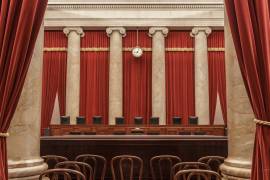
Indiana Proposes Limited Fix to Discriminatory Law; Lambda Legal Urges Full Protections for LGBT Hoosiers and Others
Blog Search
Today, Indiana elected officials announced that they have agreed on new language to modify the recently enacted law that invites discrimination against LGBT people and others in the state.
SB 50 is a significant step forward. We applaud the Indiana-based and national business leaders, and thousands of individuals coast-to-coast demanding that Indiana rescind its invitation to discriminate against lesbian, gay, bisexual, and transgender (LGBT) people. The language proposed this morning reduces the harm directly threatened by SB101, Indiana's new religious refusal law, by stating explicitly that the law may not be used by most private businesses to defend against discrimination claims. And today’s proposal, for the first time in Indiana state law, identifies sexual orientation and gender identity as characteristics for which nondiscrimination protections may exist.
But, make no mistake, while acknowledging that protections for LGBT people should be enforceable if they exist, today’s proposal does not answer the national call to “fix this now” by enacting them. This proposal fails to add sexual orientation and gender identity to Indiana’s protective framework that currently forbids discrimination based on race, religion, color, sex, disability, national origin and ancestry, leaving LGBT people unprotected across much of the state.
Assuming today’s partial “fix” does take effect, LGBT Hoosiers will remain vulnerable to being fired from their jobs, denied service in restaurants, hotels, and other public accommodations, refused housing, and treated unequally in countless other settings. We call on the legislature and Governor Pence to fix this in full by prohibiting discrimination on the basis of sexual orientation and gender identity. Every Hoosier deserves to be treated with respect.
By amending rather than repealing Indiana's hastily passed refusal law, state leadership is choosing to retain a law that remains deeply harmful. Religious refusal laws like SB101 tilt the scales in ways that can shift costs, burdens and other harms onto people who are unfairly vulnerable. As one example, today's proposal does nothing to address many of the concerns described in testimony against SB101 by our client, Amy Sandler, who recently lost her wife, Niki Quasney, to ovarian cancer. Niki's young cousins, who are genetically at high risk for breast and ovarian cancer, must take oral contraceptives to substantially reduce the likelihood of cancer. As Amy testified, the religious refusal law puts these young women in harm’s way by allowing pharmacists and other health professionals to assert a religious objection to filling their prescriptions, which would cause them harmful delays, difficulty and intense stress. Today's proposal does not change that.
Today's proposal, which applies only to certain private businesses, also does nothing to allay Amy's concerns that the refusal law will facilitate discrimination against same-sex couples and others by religiously affiliated hospitals and hospices.
In addition to jeopardizing essential patient protections in health care settings, religious refusal laws like SB101 support challenges to environmental laws, health and safety regulations, and child welfare protections, to name a few. For example, a farmer in Utah recently argued successfully in federal court that he could refuse on religious grounds to cooperate when the U.S. Department of Labor tried to investigate a claim that he has been using child labor in violation of federal law.
Freedom of religion always and rightly has been a core American value. Yet, Indiana law remains badly out of balance because LGBT Hoosiers remain unprotected in much of the state, and many others remain at risk. This is the time to enact those protections and to further amend SB101 to ensure generally that religious rights may not be used unfairly to harm others.
Learn more about Indiana's SB 101 here and here.
Read the press release.




